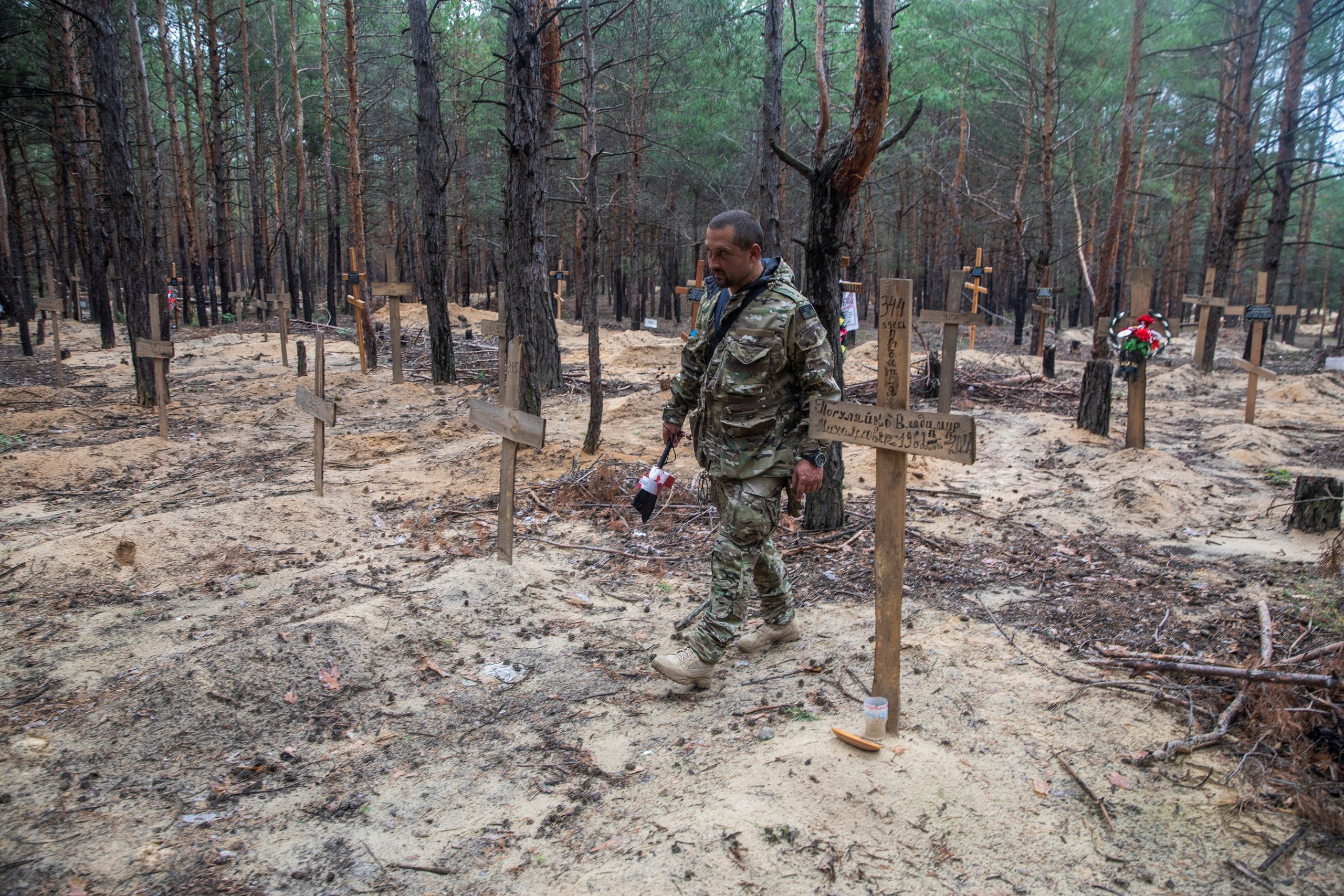
Chris Lange, FISM News
[elfsight_social_share_buttons id=”1″]
Ukrainian authorities reported the discovery of hundreds of bodies in a mass burial site near the northeastern city of Izium on Thursday, the Associated Press reported. Russian troops withdrew from Izium and other areas in the Kharkiv region last week amid an extraordinary Ukrainian counteroffensive.
Serhii Bolvinov, a senior investigator for Ukrainian police in the eastern Kharkiv region, told Britain’s Sky News that more than 400 bodies were discovered in a pit, describing the grave as “one of the largest burial sites in any one liberated city.” Reuters’ reporters said bodies with ropes tied around victims’ necks and bound hands were clearly visible at the site.
Ukrainian President Volodymyr Zelenskyy announced the gruesome discovery in a Thursday night video address.
“The necessary procedures have already begun there. More information — clear, verifiable information — should be available tomorrow,” he said.
“Bucha, Mariupol, now, unfortunately, Izium. … Russia leaves death everywhere,” he continued, referring to other cities where mass graves and signs of atrocities against Ukrainian civilians were found following the withdrawal of Kremlin forces.
“The world must bring Russia to real responsibility for this war.”
As local authorities begin the grim process of trying to identify the bodies, Bolvinov said that some of the victims had been shot while others were killed by artillery fire, airstrikes, or mine explosions.
Deputy Interior Minister Yevhen Enin on Thursday confirmed reports of “torture chambers” found in the Kharkiv region where Ukrainian citizens, as well as foreigners, were allegedly held captive “in completely inhuman conditions.” He stated that officials at one site found the bodies of a group of students from an unspecified Asian country who were taken prisoner at a Russian checkpoint while attempting to flee to Ukrainian-held territory.
“We have already come across the exhumation of individual bodies, not only with traces of a violent death, but also of torture — cut off ears, etc. This is just the beginning,” Enin said in an interview with Ukraine’s Radio NV.
Video from the site shows individual graves adorned with simple cross markers were also reportedly discovered, indicating that victims’ relatives or other local residents conducted hasty burials. Many of the graves were marked with numbers instead of names.
Izium resident Sergei Gorodko told AP reporters that among these graves were dozens of adults and children killed in a Russian airstrike on an apartment building, adding that he pulled some of the bodies out of the rubble “with my own hands.” Nearby, a mass grave containing the remains of as many as 35 Ukrainian soldiers was also found.
A spokesperson for the U.N. human rights office said on Friday that it plans to send monitors to visit the site.
“They [monitors] are aiming to go there to try to establish a bit more about what may have happened,” Liz Throssell told reporters at a press briefing in Geneva. She did not provide a specific date.
U.S. nears $16 billion in aid to Ukraine with announcement of latest drawdown
Back in Washington, Secretary of State Antony Blinken announced the drawdown of another $600 million in defensive aid to Ukraine.
“Together with our Allies and partners, we are delivering the arms and equipment that Ukraine’s forces are utilizing so effectively as they continue their successful counter-offensive against Russia’s invasion,” Blinken said Thursday in a Defense Department press release. “President Biden has been clear [that] we will support the people of Ukraine for as long as it takes,” he continued.
The new aid package brings the total of U.S.-provided assistance to Ukraine to $15.8 billion, according to the release.
Germany seizes control of Russian-owned refineries
Elsewhere, Germany is taking control of three Russian-owned refineries to ensure energy security before an embargo on oil from Russia takes effect next year, the Associated Press reported.
The Economy Ministry said in a statement that Germany’s Federal Network Agency administration will take control of Rosneft Deutschland GmbH and RN Refining & Marketing GmbH, including the companies’ shares in the refineries.
“This is a far-reaching energy policy decision to protect our country,” German Chancellor Olaf Scholz said. “We’ve long known that Russia isn’t a reliable supplier of energy anymore.”
Scholz added that the decision will ensure “that Germany is supplied with oil in the medium- and long-term as well.”
“That is particularly true for the Schwedt refinery,” he added. Located near Germany’s border with Poland, the Schwedt refinery supplies petroleum products throughout northeastern Germany.
